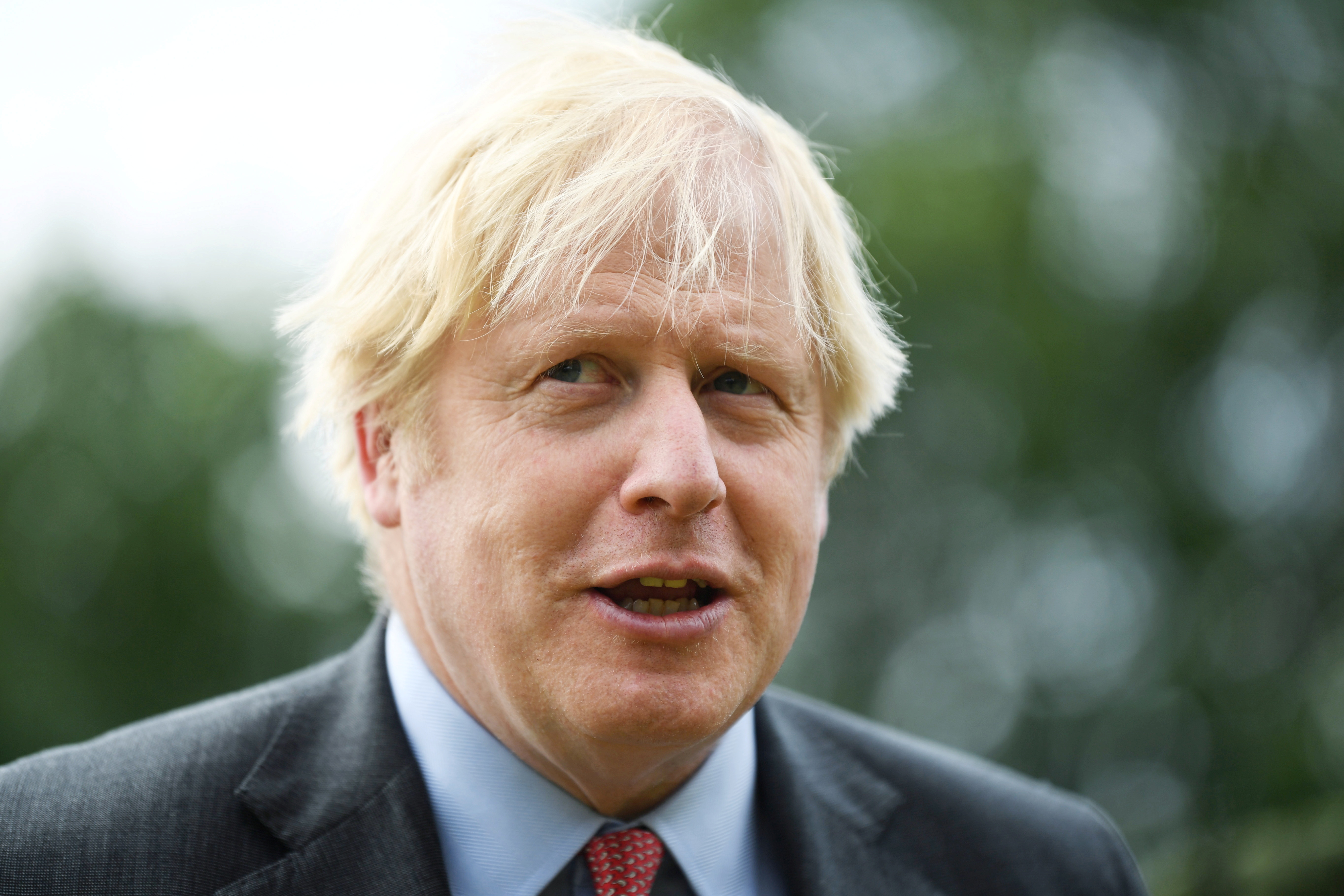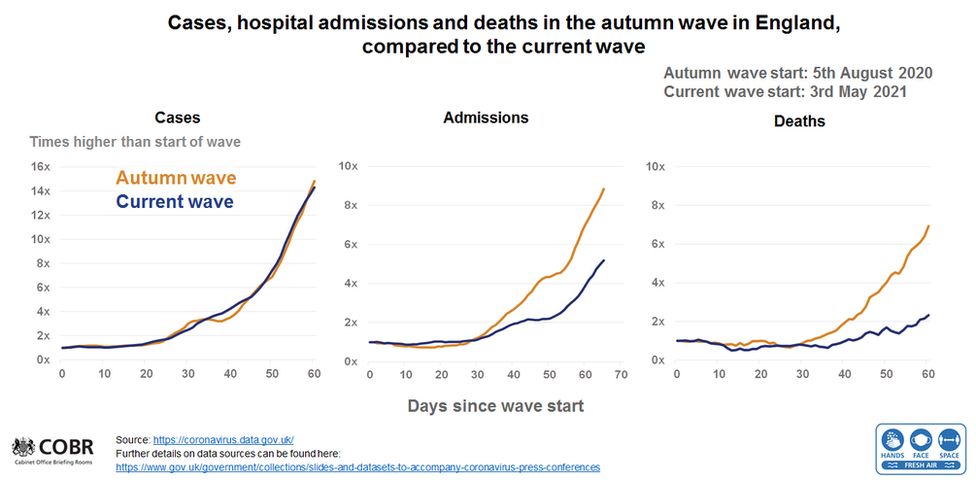"If Not Now, When?"
 |
| Prime Minister Boris Johnson Daniel Leal-Olivas/Pool |
"We've come to a stage in the pandemic when there is no easy answer and no obvious date for unlocking.""What the scientists are saying is this is the right date, or as good as any other date, to do this. But it's got to be taken seriously and we've got to go as slowly as we can given the constraints we're under.""We're trying to move toward personal responsibility, people thinking about others as well as about themselves.""If we held off until September if we waited to go for the legal unlocking that we [are doing now], then we'd be doing it in a context of a great deal more risk from the weather. It is absolutely vital that we proceed now with caution.""And I cannot say this powerfully or emphatically enough. This pandemic is not over. This disease continues to carry risks for you and your family."British Prime Minister Boris Johnson
"[The planned relaxations] amount to a dangerous, irresponsible and experimental gamble that poses a very real threat of unnecessary harm to the British public.""I am dumbfounded by the notion that public health can be left to individual choice when, in the case of infectious disease, it is, in fact, the epitome of collective responsibility."Stephen Griffin, associate professor, school of medicine, University of Leeds"Now is the time to tighten restrictions -- perhaps not to add new restrictions, but at the very least, to more rigorously enforce the existing ones.""The harm that relaxing restrictions will cause can and have been confidently predicted. When they arise, the blame for these harms can be squarely laid at the feet of the ministers responsible."Peter English, (retired) consultant in communicable disease control, immediate past chair, public health medicine committee, British Medical Association
/cloudfront-us-east-1.images.arcpublishing.com/tgam/R7JBPXTDGRIJ7PG6TLOUXKVPXI.JPG) |
People walk along a platform at King's Cross Station in London, July 12, 2021. HENRY NICHOLLS/Reuters |
The date has been set, but not without controversy and uncertainty. July 19 come hell or high water (or a sudden, understandable change in government policy), Brits will be expected to 'do the right thing' minus any further instruction-by-law from government and its agencies. Other than, perhaps, gentle verbal nudges now and again. Doing the right thing means using information and experience on best avoidance practices of contagion both for oneself and for the greater community. Which presupposes that within the general population there are no little hold-out pockets of nonbelievers in vaccines or the need to self-isolate, much less take any precautionary measures to avoid re-inviting COVID-19 to take residence within the human body.
But July 19 it is. Evidently, 'in the sagacity and common-sense awareness of the British public, we trust!'. And why not? Everything else has been tried. With a measure of success. And just when people begin to celebrate rescue from the nightmare of lockdowns, variants arrive and with them, resurgences. If memory serves right, Sweden took the anti-lockdown step to begin with, the only country in Europe to do so, trusting that Swedes would take the necessary steps on their own initiative to maintain vigilance and avoid contracting the SARS-CoV-2 virus causing COVID-19. In the process, Sweden would save its economy.
Except ... it didn't quite work out that way. The unexpected death toll emerged, and since Sweden's economy is based on trade with its near neighbours which all did institute lockdowns, it was no further ahead and perhaps measurably behind with its experiment. And now Britain is headed in the same direction. With confidence in British decision-making as individuals wishing to preserve their own lives and the functionality of British hospitals. The decision was made with the full knowledge that 100,000 cases a day could become the norm this summer.
As usual there are those who applaud the decision and those who deplore and despair over it. However, as of next Monday pubs can cast aside their restrictions to table service, limits on public gatherings to be removed and nightclubs may reopen. Mandatory face coverings will be but a bad dream. Work from home if you wish, but not under the duress of having to. Britain is now scheduled to become a test case for governments looking in from the outside, the first to touch down on 'normalcy' post-COVID, but for the fact that COVID is around and kicking ass.
Much debate led to the decision, with both the prime minister and cabinet ministers convinced that Brits absolutely need to live with the virus because it doesn't seem inclined to leave the premises. With the good feeling left by the excellent vaccination rate with over 66 percent of adults in the population fully immunized and 90 percent receiving one vaccine shot, the government feels it's now or never. Despite the surge in the Delta variant troubling public health officials concerned any further easing of restrictions will spell trouble for hospitals.
Daily COVID cases have risen 30 percent every week across Britain of late, the total doubling every 11 days. There were 34,471 new infections reported this Monday representing the highest figure since February when the country was just emerging from its most serious phase of the pandemic. "The case numbers will get a lot worse before they get better" was the good news out of the mouth of Health Secretary Sajid Javid, of the rising hospitalization numbers not yet in panic territory.
"Even if it is lower than previous peaks, the number of admissions may become challenging for the National Health Service", warned the government's Scientific Advisory Group for Emergencies, which has estimated that the daily total deaths from COVID could reach 100 by August's end. It was, said the prime minister -- despite the fears of a rising death toll -- better to move now rather than later in the summer or fall when cold weather would only exacerbate the situation.

Labels: Britain, Coping With COVID, July19, Lifting Restrictions, Prime Minister Boris Johnson

0 Comments:
Post a Comment
<< Home